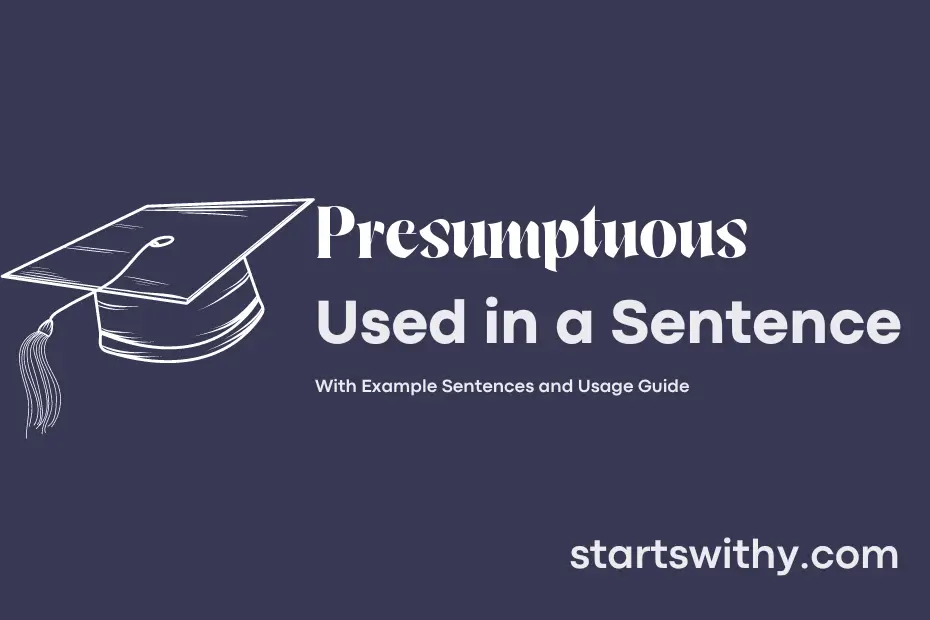Have you ever been accused of being presumptuous? Presumptuous behavior is characterized by making hasty or unwarranted assumptions without proper evidence or justification.
When someone acts presumptuously, they often come across as arrogant or overly confident in their beliefs or actions. It’s important to be cautious of appearing presumptuous, as this can lead to misunderstandings and damage relationships.
7 Examples Of Presumptuous Used In a Sentence For Kids
- I should not be presumptuous and think I know everything.
- It is not polite to be presumptuous about someone’s feelings.
- Let’s remember not to be presumptuous and wait for our turn.
- Being presumptuous can hurt someone’s feelings.
- We should always ask questions instead of being presumptuous.
- It is important to always be kind and not presumptuous.
- Remember, it is not nice to be presumptuous and assume things about others.
14 Sentences with Presumptuous Examples
- Presumptuous of me to think I can finish this assignment in one night.
- She made a presumptuous assumption about the difficulty level of the exam.
- It was presumptuous of him to believe he could secure an internship without any prior experience.
- I felt presumptuous asking the professor for an extension on the deadline.
- He had a presumptuous attitude towards group projects, thinking he could do it all himself.
- It was presumptuous of her to assume she would automatically get a high grade without putting in the effort.
- I found it presumptuous when he spoke over the professor during class discussions.
- She had a presumptuous approach to tackling complex theories without seeking guidance from the professor.
- He made a presumptuous decision to skip class, thinking he wouldn’t miss any important information.
- It was presumptuous of him to assume he could pass the exam without studying.
- She had a presumptuous attitude towards her classmates’ opinions, believing hers was always superior.
- I felt presumptuous asking for extra credit; I should have focused on improving my grades instead.
- It was presumptuous of him to think he could ace the presentation without practicing beforehand.
- She had a presumptuous belief that she could breeze through college without putting in the necessary effort.
How To Use Presumptuous in Sentences?
To use Presumptuous in a sentence, you should understand that it is an adjective that describes behavior that is overly bold or forward, often showing excessive confidence or rudeness. Here is a guide to using Presumptuous in a sentence for beginners:
- Identify a situation where someone is behaving in a way that is overly confident or arrogant.
- Think about how their behavior can be described as presumptuous, meaning they are making assumptions or taking liberties without proper consideration or permission.
- Construct a sentence using Presumptuous to describe their behavior. For example: “It was presumptuous of him to assume he would be given the promotion without even applying for the position.”
- Make sure the context of your sentence clearly conveys the idea of someone acting boldly or rudely.
- Check your sentence to ensure that Presumptuous is used correctly and fits the tone of the situation you are describing.
Remember, using Presumptuous in a sentence adds depth and specificity to your description of someone’s behavior, emphasizing their boldness or arrogance. With practice, you will become more comfortable incorporating Presumptuous into your vocabulary to effectively communicate instances of overconfidence or forwardness.
Conclusion
In conclusion, presumptuous sentences are those that make assumptions based on incomplete information or without proper evidence. These sentences often come off as arrogant or overconfident, as they assert something as true without solid proof. The use of presumptuous language can hinder effective communication and lead to misunderstandings or conflicts.
It is important to avoid making presumptuous statements and instead aim for clarity and honesty in our communication. By being mindful of our words and ensuring that our statements are supported by facts and evidence, we can foster better understanding and cooperation in our interactions. Being aware of the impact of presumptuous language can help us communicate more effectively and build stronger relationships with others.



